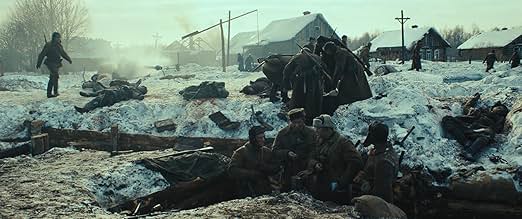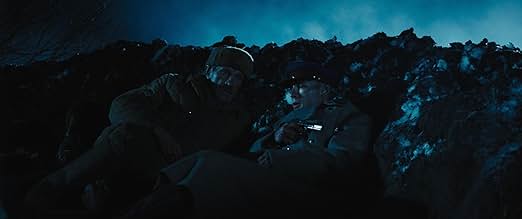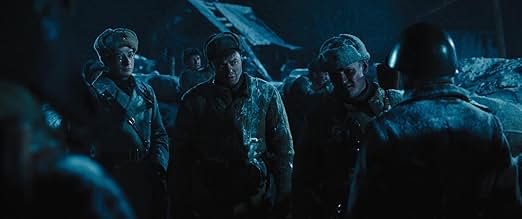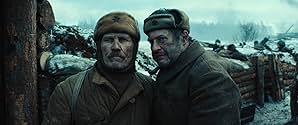IMDb RATING
6.1/10
1.4K
YOUR RATING
In the winter of 1942/1943, a series of not-so-well known, yet bloody battles occurred near the town of Rzhev. Those battles received the name of 'Rzhev Meat Grinder'. The film is based on t... Read allIn the winter of 1942/1943, a series of not-so-well known, yet bloody battles occurred near the town of Rzhev. Those battles received the name of 'Rzhev Meat Grinder'. The film is based on the award-winning novel by Vyacheslav Kondratyev.In the winter of 1942/1943, a series of not-so-well known, yet bloody battles occurred near the town of Rzhev. Those battles received the name of 'Rzhev Meat Grinder'. The film is based on the award-winning novel by Vyacheslav Kondratyev.
- Director
- Writers
- Stars
- Awards
- 1 nomination total
Daniil Voropaev
- Sgt. Lavrov
- (as Danila Voropaev)
- Director
- Writers
- All cast & crew
- Production, box office & more at IMDbPro
Featured reviews
The opening battle scene was good but suffered from war movie clichés, like having a guy drag another to safety only to find half his body missing. They also have those stock characters, the scavenger, the harsh Commissar, and the heroic, square jawed commander. But as the movie progresses, the actors settle into their roles. The commander is especially likable.
The movie is well structured. After the opening battle there is a tense pause before the German counter-attack. This gives the actors time to show us the state or the Red Army in 1942. We see the tension between the regular army and the Commissars. All war movies glam up battle scenes but it was less than a typical American production.
The behavior of the Commissars is portrayed negatively but we hear enough to understand why they identify so strongly with the state. This does not justify them but it lets you see them as humans who took a wrong turn. The Commissars have logical, if flawed, reasons for their decisions as their heavy handedness creates hostility. After a tense argument, a Commissar refuses to send help to a unit that just took a position, blurting out, 'whatever we send them will be a total loss'. He assumes the officer is being emotional but he is not allowing the army to prove what they could do given resources at critical times. I thought this interplay was well done but you have to look for it, this good writing.
They used the church imagery effectively. You see it wherever they went. You see them standing next to a wall decorated with icons and in a basement. Religious themes can feel forced but here it felt natural. Even the Commissars, famous for their atheism, chose to ignore its presence rather than fight it. You could see this going through their minds with one uncomfortable glance. The Church belonged there the Germans did not. When a German emerged from an Orthodox church at night with a flame thrower, it was chilling. It was as if they were assaulting the essence of the town.
The Germans were a better foil here than in American movies. In U. S. movies they are portrayed as evil but incompetent. This detracts from their seriousness. Here they are deadly and their presence is like a dark cloud.
Except for a few common war movie tropes, this was a very good movie.
The movie is well structured. After the opening battle there is a tense pause before the German counter-attack. This gives the actors time to show us the state or the Red Army in 1942. We see the tension between the regular army and the Commissars. All war movies glam up battle scenes but it was less than a typical American production.
The behavior of the Commissars is portrayed negatively but we hear enough to understand why they identify so strongly with the state. This does not justify them but it lets you see them as humans who took a wrong turn. The Commissars have logical, if flawed, reasons for their decisions as their heavy handedness creates hostility. After a tense argument, a Commissar refuses to send help to a unit that just took a position, blurting out, 'whatever we send them will be a total loss'. He assumes the officer is being emotional but he is not allowing the army to prove what they could do given resources at critical times. I thought this interplay was well done but you have to look for it, this good writing.
They used the church imagery effectively. You see it wherever they went. You see them standing next to a wall decorated with icons and in a basement. Religious themes can feel forced but here it felt natural. Even the Commissars, famous for their atheism, chose to ignore its presence rather than fight it. You could see this going through their minds with one uncomfortable glance. The Church belonged there the Germans did not. When a German emerged from an Orthodox church at night with a flame thrower, it was chilling. It was as if they were assaulting the essence of the town.
The Germans were a better foil here than in American movies. In U. S. movies they are portrayed as evil but incompetent. This detracts from their seriousness. Here they are deadly and their presence is like a dark cloud.
Except for a few common war movie tropes, this was a very good movie.
At last a real good Russian war movie, about the Great Patriotic War, a subject rarely close to real, actual events. There are batches of garbage propaganda stuff, where the Germans are always shown as idiots - idiots who provoked more than 25 millions deaths among the Russian population.....Here, the focus is on the Political Commisars, the Politrouks, who killed anyone who hesitated to fight. This point of view was rarely spoken in Russian movies. In this film, the enemy is maybe more them than the Germans. Political commissars and their bloodthirsty decisions, who ordered the deaths of thousands of soldiers only to take a simple hill. For Staline and his gang, the human life of their own fellows was nothing. They were more than Germans; one Nazi for one hundred Russians. An unbalanced fight. I have always found weird and not logical that people defending their life, freedom and homeland - the Russians - needed Political commissars to prevent them to desert.....The Nazis did not in Russia; maybe for obvious reasosn though. Where a deserter would have been, among the "Untermenschen", slavic "under men'; they were safer in the middle of their own "kameraden'...So, to summarize, I highly recommend this feature.
What make the difference between russians war movies and american ones is beside in russian movies plays actors like actors no thirsty for money inferior formes of life.the fact all russian war movies are inspired by real events who realy take place, not like in american movies all crapy fictions like their contribution to the defeating of Germanyin WW2.
The rating on this one is baffling as it is clearly undeserved. This movie captures the Eastern Front very well, more so than many other Russian movies I have so far seen. If you liked 1993's Stalingrad, you will like this one.
This film covers one of the least-written-about major battles of World War 2, the Rzhev Meatgrinder, which was a series of battles fought west of Moscow 1941-1943. The Russians threw wave after wave at the Germans but, in the end, it was basically all for nothing as the German positions were much too strong. The Rzhev salient only ended when the Germans retreated in order to shorten their lines due to manpower shortages after their disastrous defeat at Stalingrad.
Here, we get a remarkably balanced portrayal of the average Russian infantryman's experience and fighting abilities during the war. Surprisingly, this film pulls no punches in depicting the bureaucratic incompetence of the Soviet Union at the time, with Generals making bad decisions and the dead weight incubus effect that ideologue political officers had on the other soldiers. Nicely we do get to experience one political officer have a change of heart from his front line experience, and lots of little bits of humanity scattered throughout.
Coming off the Fyodor Bondarchuk STALINGRAD movie a few years ago, I expected a lot of the same over-reliance on CGI and MTV style editing, but thankfully it's all kept to an absolute minimum and largely bunched up into the opening action scene. The rest of the film actually features a fairly deliberate pace and some of the best night time cinematography I have seen in years. The battle scenes mostly don't disappoint in depicting the enemy as cunning, the chances of victory low, and the stakes high. There are a few instances of people unrealistically mowing down hoards of advancing soldiers with a single machine gun but it's nothing we haven't seen before.
Try and find a subtitled version of this film if you can as the English dubbing is absolutely horrendous. None of the voices have any emotional authenticity in them at all, even during the screams of pain and excitement. This film isn't perfect, but I'd put it nearly as on-par of an Eastern Front Adventure as your average Finnish war movie from 20-30 years ago.
Here, we get a remarkably balanced portrayal of the average Russian infantryman's experience and fighting abilities during the war. Surprisingly, this film pulls no punches in depicting the bureaucratic incompetence of the Soviet Union at the time, with Generals making bad decisions and the dead weight incubus effect that ideologue political officers had on the other soldiers. Nicely we do get to experience one political officer have a change of heart from his front line experience, and lots of little bits of humanity scattered throughout.
Coming off the Fyodor Bondarchuk STALINGRAD movie a few years ago, I expected a lot of the same over-reliance on CGI and MTV style editing, but thankfully it's all kept to an absolute minimum and largely bunched up into the opening action scene. The rest of the film actually features a fairly deliberate pace and some of the best night time cinematography I have seen in years. The battle scenes mostly don't disappoint in depicting the enemy as cunning, the chances of victory low, and the stakes high. There are a few instances of people unrealistically mowing down hoards of advancing soldiers with a single machine gun but it's nothing we haven't seen before.
Try and find a subtitled version of this film if you can as the English dubbing is absolutely horrendous. None of the voices have any emotional authenticity in them at all, even during the screams of pain and excitement. This film isn't perfect, but I'd put it nearly as on-par of an Eastern Front Adventure as your average Finnish war movie from 20-30 years ago.
Did you know
- TriviaDuring the last battle a jet trail can be seen in the sky
- How long is Rzhev?Powered by Alexa
Details
Box office
- Gross worldwide
- $1,401,156
- Runtime1 hour 53 minutes
- Color
Contribute to this page
Suggest an edit or add missing content

























